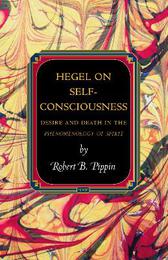
|
Hegel on Self-Consciousness: Desire and Death in the Phenomenology of Spirit
Hardback
Main Details
| Title |
Hegel on Self-Consciousness: Desire and Death in the Phenomenology of Spirit
|
| Authors and Contributors |
By (author) Robert B. Pippin
|
| Series | Princeton Monographs in Philosophy |
|---|
| Physical Properties |
| Format:Hardback | | Pages:120 | | Dimensions(mm): Height 216,Width 140 |
|
| Category/Genre | Western philosophy - c 1600 to c 1900 |
|---|
| ISBN/Barcode |
9780691148519
|
| Classifications | Dewey:193 |
|---|
| Audience | | Tertiary Education (US: College) | | Professional & Vocational | |
|---|
|
Publishing Details |
| Publisher |
Princeton University Press
|
| Imprint |
Princeton University Press
|
| Publication Date |
26 December 2010 |
| Publication Country |
United States
|
Description
In the most influential chapter of his most important philosophical work, the "Phenomenology of Spirit", Hegel makes the central and disarming assertions that 'self-consciousness is desire itself' and that it attains its 'satisfaction' only in another self-consciousness. This book presents a fresh interpretation of these revolutionary claims.
Author Biography
Robert B. Pippin is the Evelyn Stefansson Nef Distinguished Service Professor in the John U. Nef Committee on Social Thought and in the Department of Philosophy at the University of Chicago. His books include "Hegel's Practical Philosophy: Rational Agency as Ethical Life" and "Henry James and Modern Moral Life".
Reviews"Pippin, one of the finest contemporary scholars on Kant and post-Kantian German idealism, presents here two essays that focus on two of Hegel's claims--that self-consciousness is desire itself, and that it finds its satisfaction only in others... Pippin's essays provide a skillful interpretation of one of the most important parts of Hegel's corpus, and illuminate Phenomenology of Spirit as well as historical and contemporary interpretations of Hegel's account of self-consciousness."--Choice "This book should appeal to readers interested in the Phenomenology of Spirit, especially graduate students and researches who wish to understand the contemporary significance of Hegel's account of self-consciousness for McDowell and Brandom. Pippin has provided a lucid reading of these very dense passages. Regardless of whether one agrees with Pippin's reading, it will prove difficult for Hegel scholars to ignore."--Corey McCall, Philosophy in Review
|